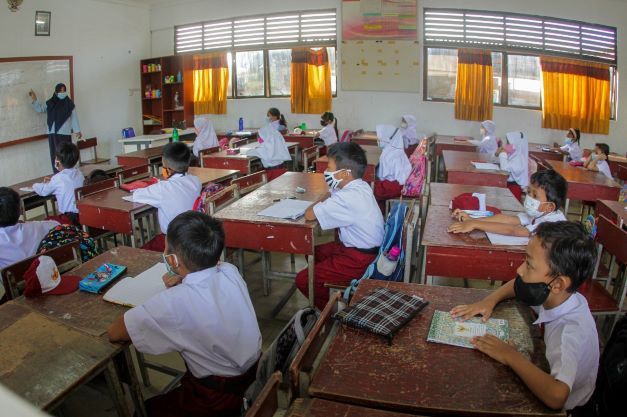Popular Reads
Top Results
Can't find what you're looking for?
View all search resultsPopular Reads
Top Results
Can't find what you're looking for?
View all search resultsCurriculum 2024 and the changing role of teachers
While all stakeholders should welcome the new curriculum, it will not succeed unless the deep-seated, conservative mindset of Indonesian education can be changed.
Change text size
Gift Premium Articles
to Anyone
The Education, Culture, Research and Technology Ministry recently announced a plan to launch Curriculum 2024. Ahead of its implementation, schools across the country can trial the prototype curriculum at the start of the new school year in July.
The new curriculum has been designed to improve the quality of learning and offer some contingencies for dynamic teaching and learning during these unprecedented times. Anindito Aditomo, the head of the ministry’s Educational Standards, Curriculum and Assessment Agency, said the new curriculum aimed to transform schools into a safe, engaging and meaningful space for learning.
Some of the main characteristics that feature in the new curriculum, according to Anindito, is a primary focus on competency rather than content. To achieve this aim, teachers and students will be spending more time during the learning process in discussions, question-and-answer sessions and giving feedback. Students will also participate in debate, team activities and negotiation to try and resolve issues that are relevant to their environment.
While the idea is brilliant and deserve our support, the plan may face some obstacles in its implementation, considering the nature of Indonesian classrooms and the deep-seated mindset that needs challenging. In this regard, teachers, parents, schools and other stakeholders and agencies play a vital role in making sure that the new curriculum works.
Engaging, interactive learning as suggested by the new curriculum is not something new, especially in English language classes. Communicative language teaching (CLT), competency-based language teaching (CBLT) and task-based language teaching (TBLT) share similar features, and they are used in English language classes in Indonesia, or at least their implementation has been attempted.
However, a 2008 study conducted by the late Maraden Marcellino, a linguistics lecturer at Atma Jaya Catholic University in Jakarta, revealed that Indonesian classrooms may not be ready for such methods. The new curriculum demands that students be independent and teachers switch from being authoritative agents to being facilitators.
Maraden also said that cultural factors, such as students’ social and ethical values and beliefs, did not suit interactive, engaging activities in the classroom. His study found that many Indonesian students showed total obedience to teachers, had unquestioning minds and shared the belief that their elders know best and teachers can do no wrong. These characteristics prevented them from participating actively in classroom discussions. Their fear of being “in the wrong” and being embarrassed for making a mistake or saying something “incorrect” could discourage students from speaking up.
Thus, unless we can change such mindsets, Curriculum 2024 will not succeed in improving the quality of Indonesia’s education.
Perhaps the change can start with teachers by shifting their role from being an authoritative agent whose responsibility is limited to transferring information or knowledge to students, to being a facilitator and mediator of teacher-student and student-student interactions and discussions.
Teachers need to create a safe environment in which students feel comfortable about expressing their ideas and views. Teachers must also encourage students to undergo trial and error so they can learn from their mistakes.
But the toughest challenge for teachers is to accept their new role under the new curriculum and relinquish their old responsibilities.
In the past, we might have believed that students arrived in the classroom with zero knowledge and that teachers knew everything. Nowadays, however, this may no longer be the case. With the advancement of technology and access to the internet, Indonesian students might have armed themselves with information and knowledge of school subjects prior to attending a class.
Under the new curriculum, teachers will play a pivotal role in helping students navigate those resources and in mediating the learning process. If we reflect on Lev Vygotsky’s sociocultural theory of learning, learners’ existing knowledge also plays a role in creating new knowledge.
Teachers need to recognize, instead of just assuming, what students do not know and help them make sense of the unknown. Their new responsibilities demand that teachers improve their skills and keep up-to-date on new knowledge so they are able to guide their students.
In sum, all stakeholders need to support Curriculum 2024, which has been proposed in an attempt to raise the national education standards. The new curriculum, however, will not develop and bear fruit as expected if the country’s democracy does not flourish and freedoms are curtailed.
***
The writer is a doctoral candidate in applied linguistics at the University of South Australia.










